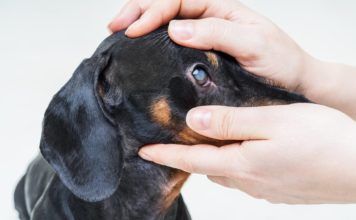Understanding How Your Dog Responds to You
The Low-Down on Hypoallergenic Dogs
[From Tufts October 2012 Issue]
Malia is allergic, said President Obama about his elder daughter when the family was looking for a dog, so it has to be hypoallergenic. There are a number of breeds that are hypoallergenic.
If only his Cabinet had a Secretary of Canine Concerns. Theres no such thing as a guarantee that a dog will not cause an allergic reaction, even though the Internet brims with lists of so-called hypoallergenic dogs; even though the American Kennel Club itself names almost a dozen hypoallergenic breeds; and even though many people believe that …
Does Your Dog Need Supplements?
[From Tufts October 2012]
We did a study on two kinds of supplements people frequently decide to give to their dogs with heart disease, says Tufts veterinary nutritionist Lisa Freeman, DVM, PhD, DACVN, and found that six of 13 products did not disintegrate effectively, which suggested that they may not be be absorbed effectively in the gastrointestinal tract.
Another study, conducted by researchers at the University of Guelph in Ontario, looked at probiotics - both veterinary and human products. In 17 out of 44 supplements - more than one in three - the probiotic organism was either improperly identified or did not even exist.
People think supplements are regulated as if they were drugs, Dr. Freeman says. But theyre not. Drugs must be proven to be safe and effective and made with good quality control before theyre put on the market. Supplement manufacturers dont have to prove anything. The onus is on the Food and Drug Administration to prove. …
The Wrong and the Right Way to Ease Your Dog Past Fear
[From Tufts November 2012 Issue]
Tufts Behavior Clinic Director Nicholas Dodman, BVMS, tells the story of a client whose way of making her dog stop feeling scared of car rides was to drive from Massachusetts up to Northern Maine and back. It didnt work. The dog was salivating, shivering, the whole time, Dr. Dodman says. By the time the 7-hour ordeal was over, the animal was in a dreadful state.
Dr. Dodman wasnt surprised that the woman thought she was doing the right thing. There are even certain trainers, he says, who, if a dog is frightened of the sound of a boiler going on and off, will tie the dog to the boiler. The theory is that if you leave the dog there long enough, she will go numb and become habituated. Or, if the dog is scared of …
Dog Eared
[From Tufts November 2012 Issue]
The head of our Behavior Clinic, Dr. Nicholas Dodman, was stumped by the case of a Blue Merle Collie experiencing panic attacks several times a day, seemingly out of nowhere.
How often does it happen? he asked the owner.
There was no set answer. The woman explained that with no particular rhythm to the episodes, the dog, named (appropriately enough) Blue, would begin panting and pacing and even salivating. Then the bout would pass and, a while later, without warning, would happen again.
Dr. Dodman wondered if perhaps there was some kind of noise that could be causing the frequent occasions of hyper-anxiousness, but Blues owner didnt think so. She did offer, however, that whenever she and Blue went to her girlfriends house a few blocks away, and also when she left Blue there overnight, he never had the bursts of panic. Clearly, …
Medication as a Last Resort for your dog
In some cases, no matter how slowly you go and how patient you are, a dog's genetics or unfortunate experiences prior to coming to live with you may keep her debilitatingly fearful of some thing, or things. If it's the sound of a household object, you will probably be able to work around it. But if it's car rides, or people — that is, things in life from which you cannot keep her completely hidden — a prescription from your veterinarian for anti-anxiety medication may be in order. No one wants to give a dog behavior-modifying medications. But they are a reasonable last resort if a pet has been unresponsive to systematic desensitization and having the dog as a member of the family has become too difficult as a result.…
The risk in subzero temperatures for your dog
Puppy Diets Need More Protein and Fat
Air Snapping and Stargazing: It Might Be Dog OCD
The unmistakable sign of an ear infection on dogs
[From Tufts May 2012 Issue]
To many people, the smell of baking bread evokes recollections of home cooking. But if your dogs ears emit a similar odor, its cause for concern: You need to put in a call to his veterinarian. Its a sign that he may have a yeast infection - a condition that, if left untreated, can lead to significant discomfort, complications and even partial deafness on those rare occasions when a persistent infection results in rupture of the eardrum.
Ear infections are the No. 1 reason for veterinary visits in one pet insurance companys review of nearly a half million claims. A particular kind - yeast infections - is extremely common in dogs, but the term is actually imprecise, according to dermatologist Lowell Ackerman, DVM, adjunct professor of clinical medicine at Cummings School of Veterinary Medicine at Tufts University.
…Owner-Directed Aggression in Dogs
Help for tear stains for my dog
[From Tufts June 2012 Issue]
My 4-year-old shih tzu, Piccolo, gets tear stains frequently. When he develops conjunctivitis a few times a year because of his unspecified allergies, the stains drip onto the hair underneath his eyelid. His black hair then becomes matted and turns an unsightly pink. He scratches the stained areas while I'm not around to catch him in the act until he reaches the skin, which becomes tender. I can live with his appearance but not the itchy eyes and irritated skin.
The Internet has all kinds of "remedies" from vinegar to Tums. I've also read that a popular over-the-counter product is verboten because it contains the antibiotic Tylosin. I don't want to practice medicine on my little guy. Piccolo's veterinarian said to clean the stains with hydrogen peroxide, which works well, except while…









